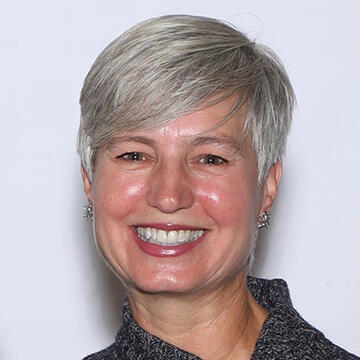
Cathy Gabor
Associate Dean, Arts and Humanities
Biography
Professor Gabor identifies first and foremost as a teacher. She finds joy in reading and responding to student writing. She describes her approach as "teaching at the edge of chaos" because most of her assignments ask students to interact with real world audiences through digital, oral, and written rhetoric. Her research projects, mostly classrooms studies, stem from her deep love of teaching and are often inspired by things she has learned from students.
For most of her career, Professor Gabor has occupied professional leadership roles, which allow her to collaborate with experts within and outside the university. In her spare time, she enjoys trail running, Zumba, and creating crossword puzzles. She and her spouse have two children – one graduated from USF in 2021.
Expertise
- Rhetoric and composition
- Writing in electronic environments
- Ignatian pedagogy
Research Areas
- Digital rhetoric
- Eloquentia perfecta
- Labor-based grading
- Scholarship of administration
Appointments
- Treasurer, USF Faculty Association
- Coordinator, Writing Program in Rhetoric
- Co-Chair, Core Advisory Committee
- Chair, Directed Self-Placement Committee
- Steering Committee Member, Center for Teaching Excellence
- Steering Committee Member, Educational Technology Services
Education
- Texas Christian University, PhD in Rhetoric and Composition, 2004
- Indiana University, MA in English, 1992
- Bethany College, BA in English, 1989
Prior Experience
- Writing Program Administrator, San Jose State University
Awards & Distinctions
-
Open Educational Resources Grant, USF, 2020
-
Faculty Award for Technology Innovation, USF, 2017
-
Digital Media and Composition Faculty Institute, The Ohio State University, 2016
-
Carnegie Faculty Fellow, California Campus Compact, 2011
Selected Publications
-
“Reading, Writing, Produsing: Fostering Student Authors in the Public Space.” Digital Reading and Writing in Composition Studies, edited by Mary Lamb and Jennifer M. Parrott. Routledge, 2019. 144-160.
-
“Magic, Agency and Power: Mapping Embodied Leadership Roles” (co-authored with Tina Kazan). WPA: Writing Program Administration Journal 37.1 (Fall 2013): 134-160.